The Social Perspective, a Missing Link in Getting More People Into Urban Cycling
As a growing number of cities are working to make streets safer and more attractive to ride bicycles, it is becoming more pressing than ever to grow the uptake in cycling. The more people use cycling facilities, the more worth these facilities have, and the more support there is for the next steps. Some people believe in the adage ‘build it and they will come’, trusting that many citizens are open, ready, and supportive of the idea to explore by themselves what is offered.
Have you ever wondered why people in your city aren’t riding bicycles? Then keep reading, as our new Masterclass is designed to help you tackle exactly that!
Lead by Example
The reality is that for many people, this doesn’t work. It’s risky to assume people will come without showing how to use the new facilities. We need to lead by example. Helping communities understand the rules, feel safe, and feel welcome in these spaces. This is especially essential for those who have never ridden a bike before or are new to biking. Without guidance, the barrier to picking up a bicycle feels too high. It is a missed opportunity if new infrastructure and services for cycling are not promoted in ways that are meaningful for people new to cycling. With the pressing issue of advancing the mobility transition, we can’t afford to have this attitude!
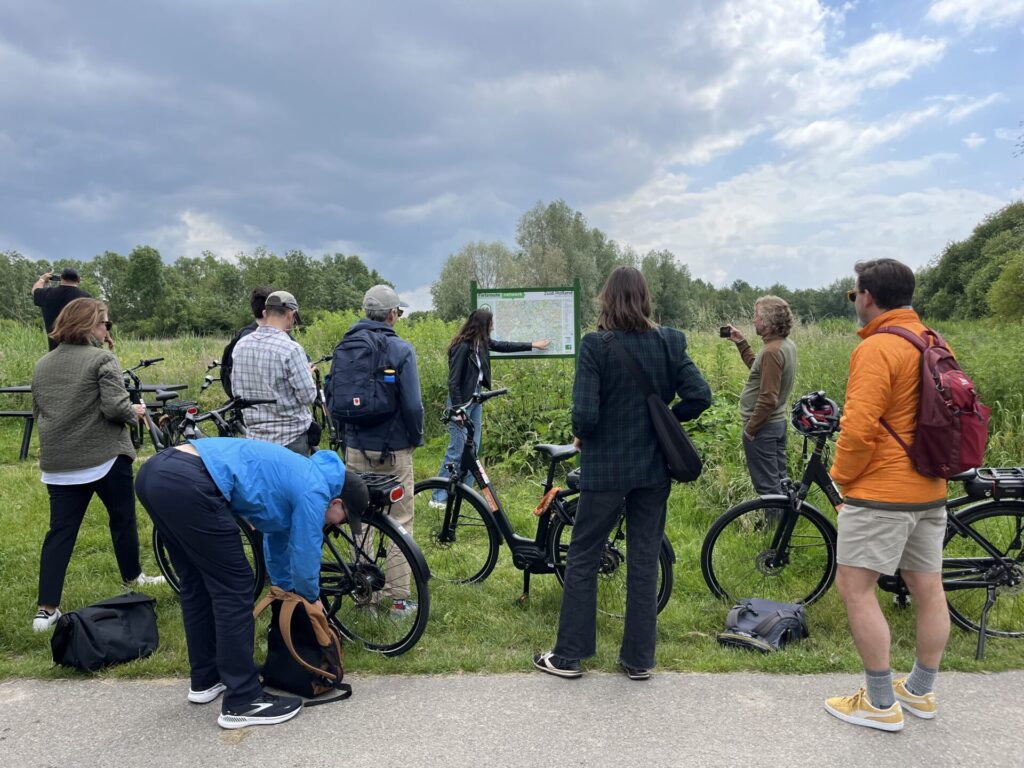
Cycling From a Social Perspective
If people do not spontaneously hop on their bikes, what can we do to increase the uptake of cycling and build support for future measures? We can take a social perspective on cycling and cycling uptake! Since humans are social creatures. People live in networks, not in isolation, even in highly individualistic societies. People care about others, and about what others think and do, or what they think other people do.
How, then, can we look at cycling from a social perspective? In 2011, Elizabeth Shove (Emeritus Distinguished Professor of Sociology at Lancaster University) held an ’extraordinary lecture’ in the British Library, on how social science can help climate change policy. She vividly explained and illustrated social practice theory, including what social practices are, how they function, and how this perspective can help address persistent societal issues. Inspired by her work and that of Peter Cox, we have been applying this perspective to our projects for over a decade.
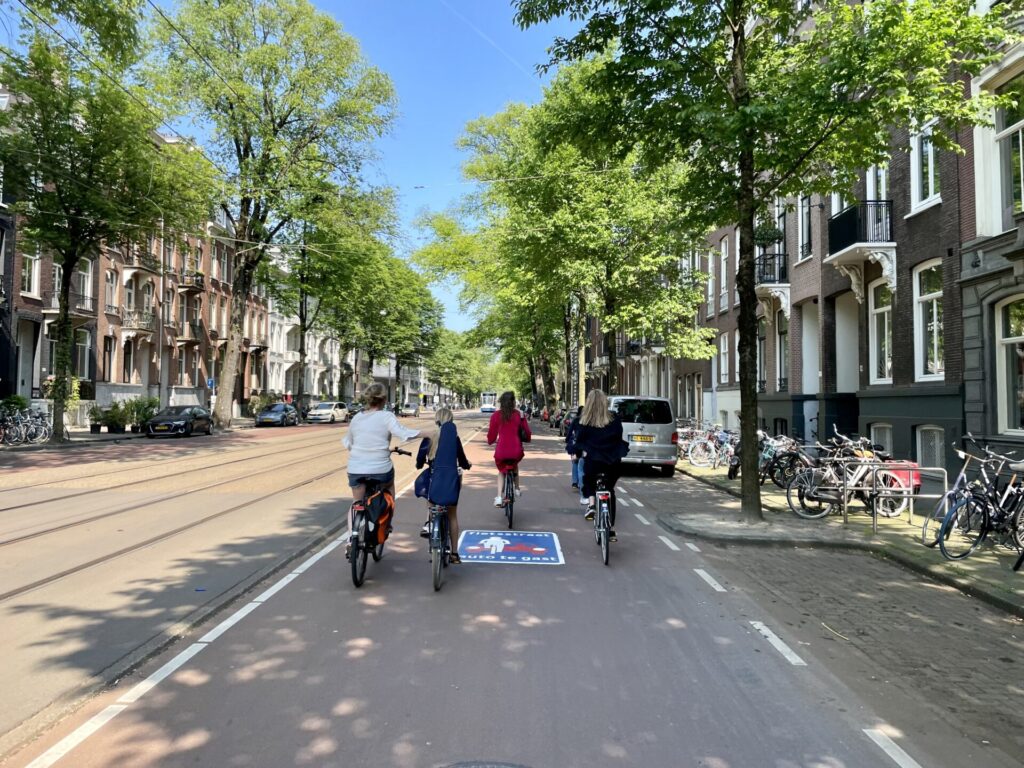
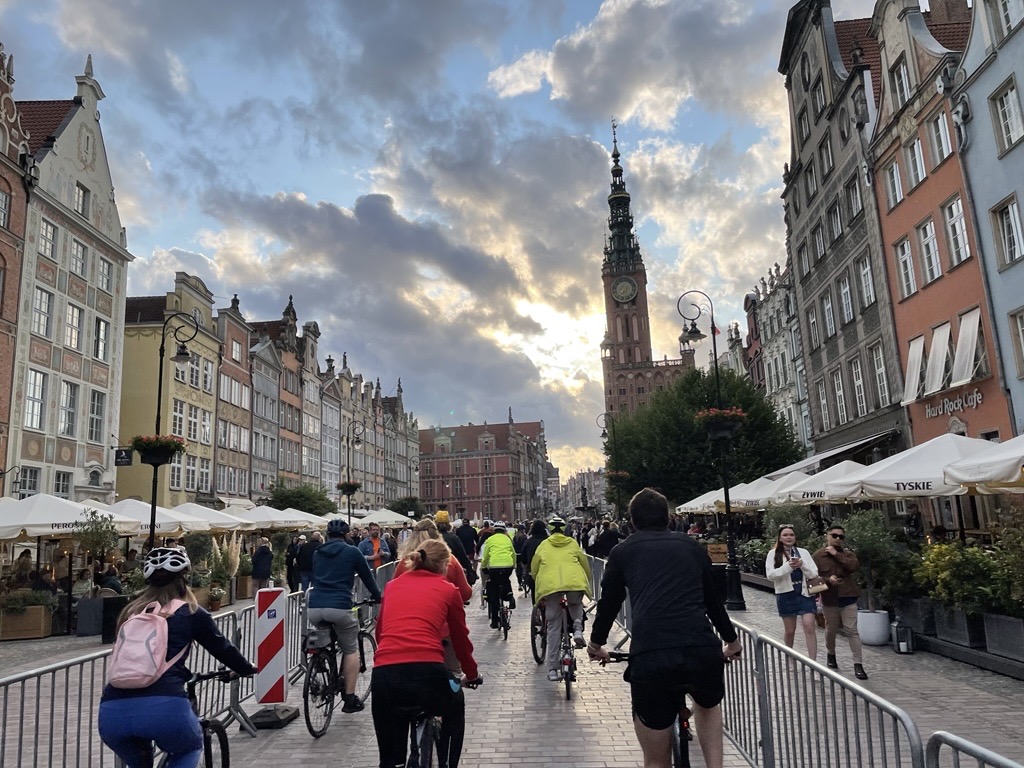
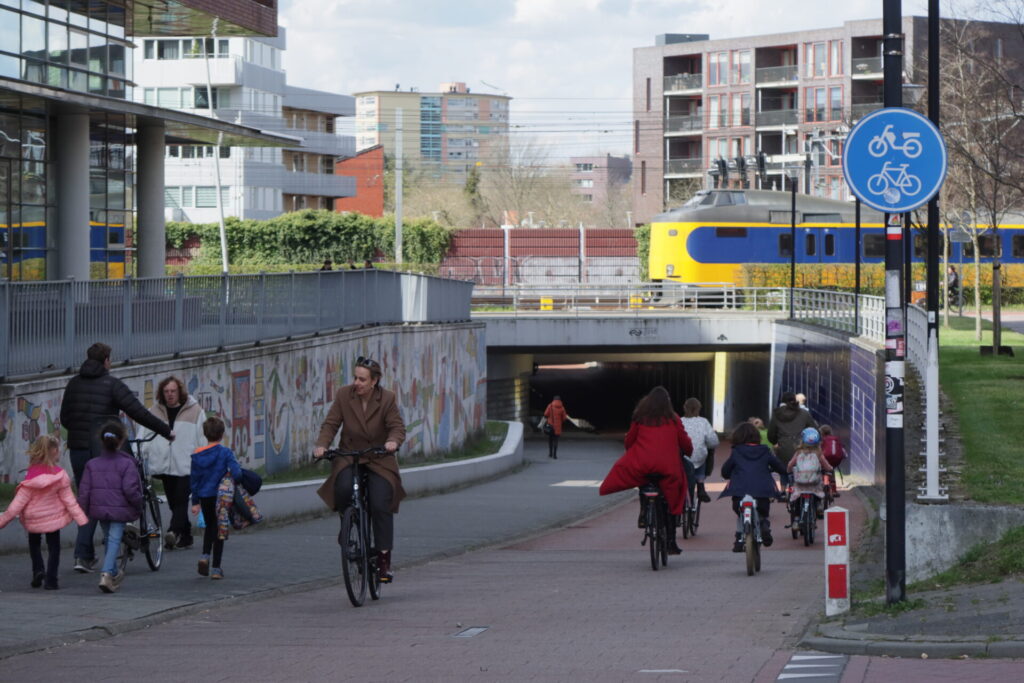
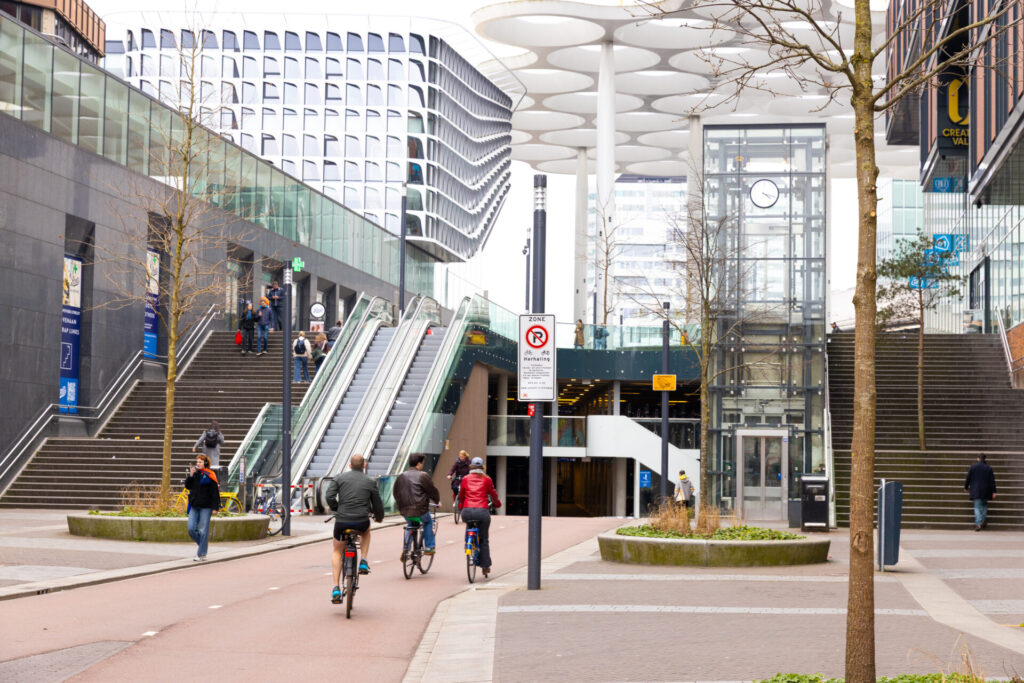
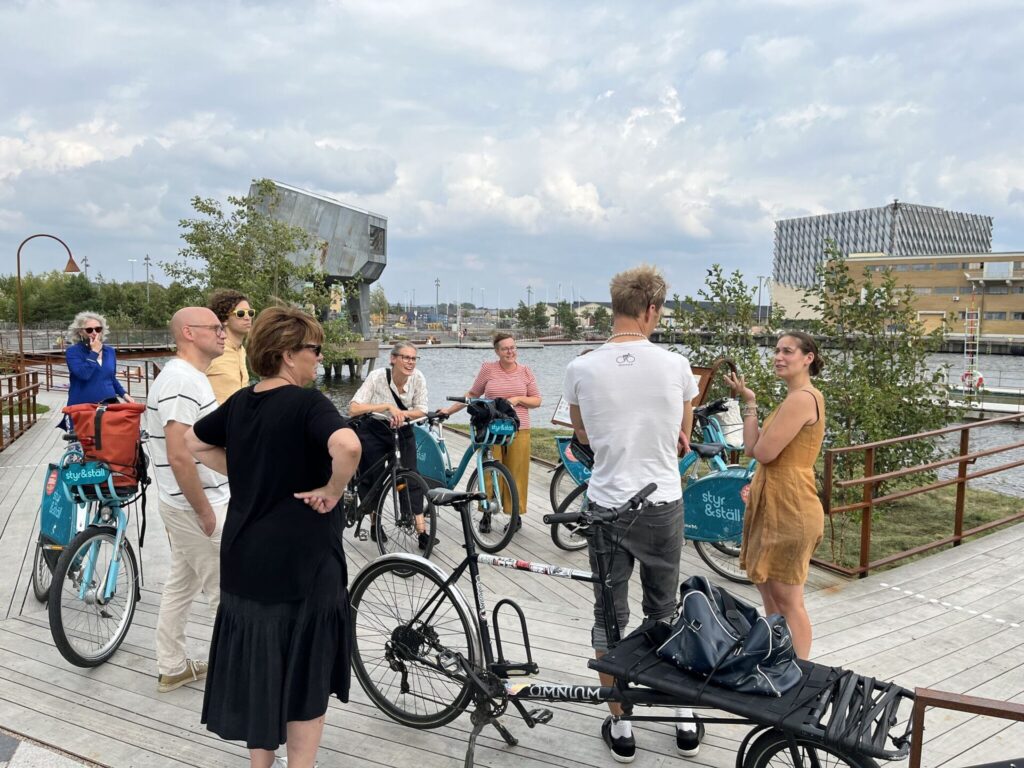
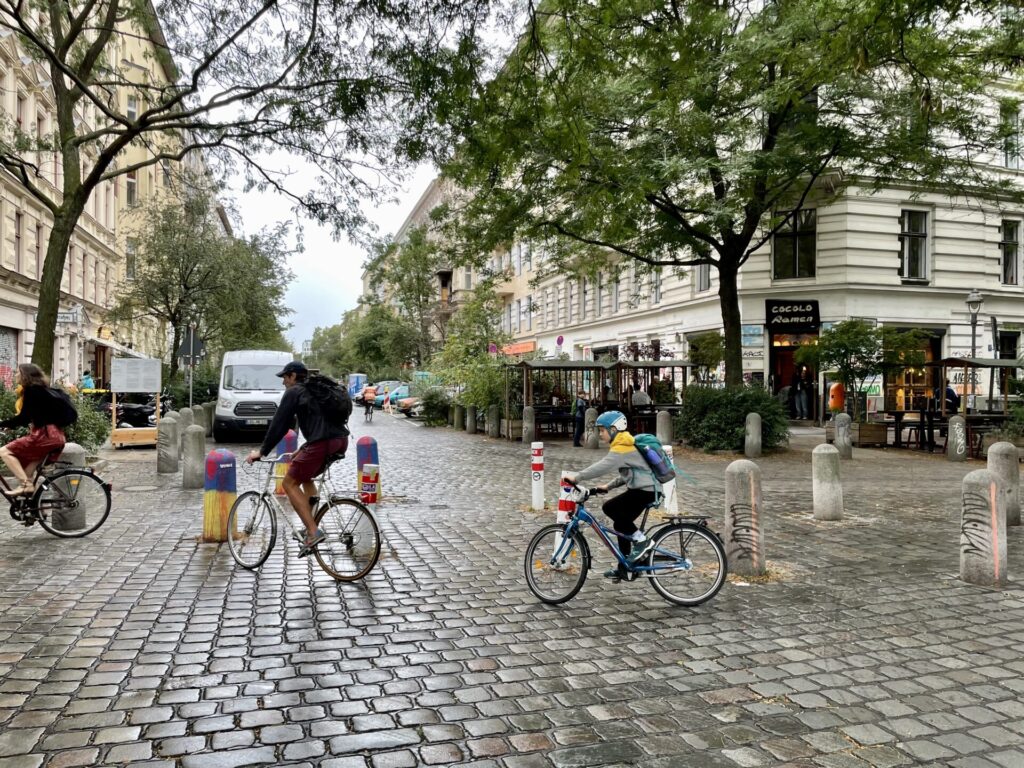
Materials, Competences, and Meaning
The core idea of social practice theory is that each practice consists of three interconnected elements. The three elements are: materials (objects, tools, physical infrastructure), competences (skills and practical know-how), and meaning (or image) of the practice. Furthermore, a specified practice, with its elements, is put at the centre of attention. From this starting point, it is possible to unravel the elements of the practice by filling in all of the elements very concretely, with specific persons or groups in mind.
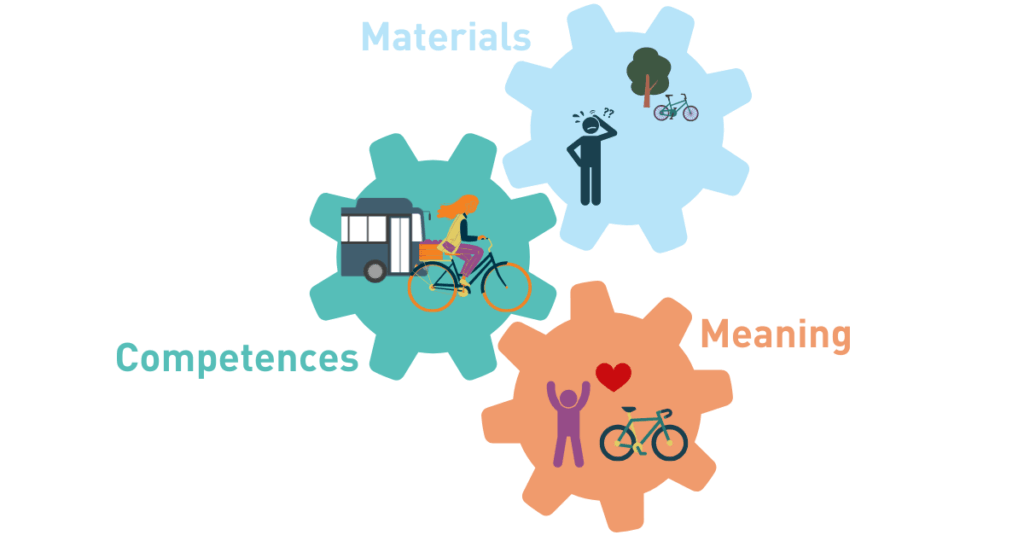
Elements of Cycling to a Grocery Shop
Let’s look at an example. We apply this method to the practice of cycling to a grocery shop. First, from the perspective of a person who already practices cycling to the grocery shop:
- Materials: This person owns a bicycle, along with panniers for shopping, and there is suitable infrastructure for cycling and bike parking at the grocery store.
- Competences: This person possesses the physical skills to ride a bicycle, knows a route to the grocery store, and knows how to lock a bike safely.
- Meaning: This person holds a positive image of cycling to the grocery store.
For this person, all elements are in good shape and connected. It’s easy to practice cycling to the grocery store.
We then do the same for a person who does not practice cycling to the grocery shop:
- Materials: This person owns a bicycle, but no panniers. There is relatively suitable infrastructure for cycling, but no bike parking at the grocery store.
- Competences: This person has the physical skills to cycle, knows a route to the grocery store, and knows how to lock a bicycle safely.
- Meaning: This person has never considered cycling to the grocery store.
For this person, the elements of cycling to the grocery store are too weak to perform this practice. It is preventing this person from engaging in this practice.
Lastly, we look at a person who does not practice cycling:
- Materials: This person does not own a bicycle or panniers. There is relatively suitable infrastructure for cycling and bike parking at the grocery store.
- Competences: This person lacks the physical skills to cycle, is unfamiliar with cycling routes to the grocery store, and is unaware of how to lock a bicycle safely.
- Meaning: This person doesn’t think much of cycling to the grocery store.
For this person, the elements of cycling to the grocery store are very weak, or even absent. Although there is suitable infrastructure for cycling and bike parking, this person will not cycle to the grocery store as long as nothing changes in the elements of competences and meanings. Once these become positive, this person may also buy, borrow, or rent a bicycle and start cycling to the grocery store.

Growing Cycling
When it comes to the social practice element of ‘meaning’, an essential factor is the image that cycling holds in people’s minds. In many places around the world, this image is dominated by exercise, efficiency of travel, and is often associated with achievers, superhumans, or hazardous risk-takers. Many of us do not see ourselves belonging to these groups, nor do we value exercise as much as those who already cycle. At the same time, cycling can offer people so much more, like positive experiences, relaxation, socialization, connection, and simplicity.
Are you facing this challenge of growing the uptake of cycling in an environment where many don’t know what cycling has to offer to them? Or have you ever wondered why people in your city aren’t riding? Then keep reading, as our new Masterclass is designed to help you tackle exactly that!
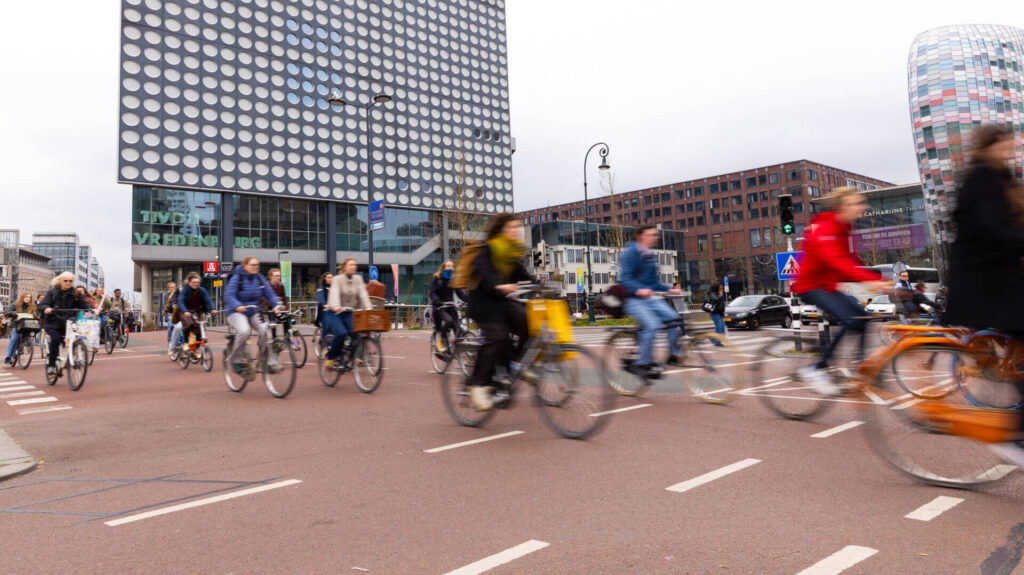
Using a Social Perspective to Get More People Cycling: A New Mobycon Masterclass
If you want to learn how to develop a plan for growing the uptake of cycling, without having to ask each inhabitant in your city about their (non-)cycling practices and elements, then this new Masterclass Using A Social Perspective To Get More People Cycling is for you! Sign up for this Masterclass, which consists of four online sessions, and gain key insights into attracting new cyclists and encouraging more cycling. During this Masterclass, we accompany you in developing and implementing your plan to reach your target group.
After the last session, you won’t just leave with ideas. You will go home with a concrete, ready-to-use plan. You will have a clear picture of who you want to reach, what is holding them back from cycling, and which social ‘hooks’ can help shift their thoughts about cycling. You will design a compelling message, identify key stakeholders, and develop a set of concrete, impactful activities ready to test in your city or region. Whether you work for a municipality or a local organization, you will be equipped with the tools and confidence to encourage more people to cycle.
Furthermore, the Masterclass provides you with the opportunity to connect with peers from other countries who face similar challenges. It is a space for exchanging ideas, sharing experiences, and learning from one another. You will not only walk away with a practical and inspiring method to increase cycling uptake in your city, but you will also build new connections in the professional field.
Who is Angela van der Kloof?
In the 1990s, Angela became involved in the cycling field by teaching migrant women in her city in the Netherlands how to cycle. Over the past 15 years, she has helped hundreds of women learn to ride bikes. She developed teaching methods and materials, train-the-trainer programs, and innovative campaigns on which she presented at multiple international cycling conferences. In 2008, she began working as an advisor with Mobycon, bringing her unique expertise and hands-on mentality to consulting projects. Her focus is on supporting authorities in increasing the use of active modes of transport and in helping to develop a fair and sustainable mobility transition. Mobility education, the development of a positive and active mobility culture, qualitative research, social innovation, and stakeholder management and engagement are her key areas of expertise.
Angela regularly speaks at conferences and participates in panel discussions, such as the Cyklomestá Conference in Trnava in Slovakia (2025), the Inclusion and Health panel at the High-Level EU Cycling.
Conference in Hasselt, Belgium (2024), expert in the round table ‘Increasing the Share of Cycling and Walking in Urban Mobility’ for the International Transport Forum (ITF) for OECD in Paris, France (2022), and panelist for the Transforming Transportation conference in Washington D.C., United States (2020).
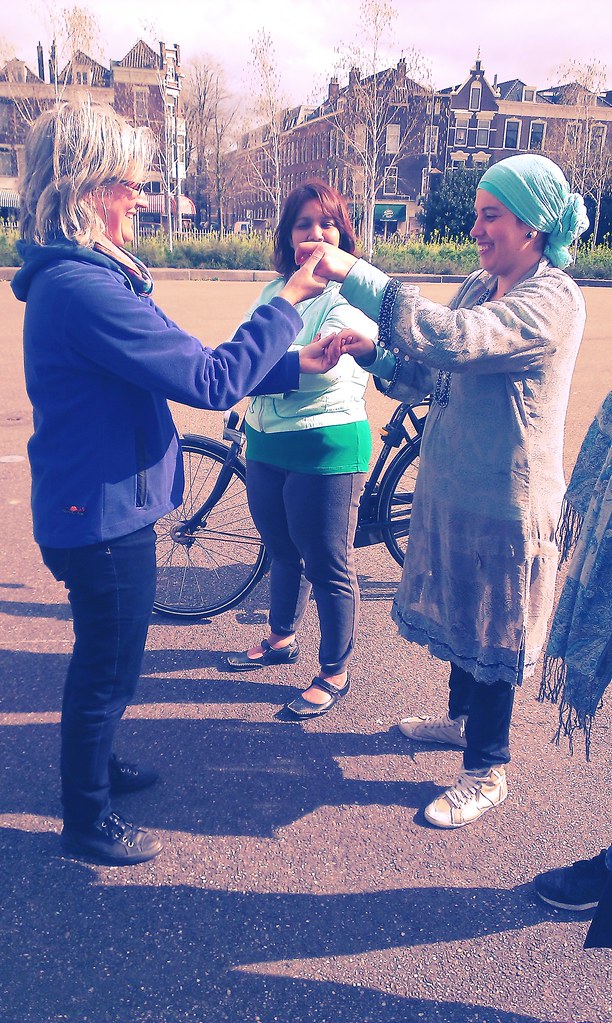
Over the years, she has developed workshops, training sessions, webinars, and study tours for clients in Ireland, Finland, Sweden, Canada, the US, the UK, Spain, Austria, Albania, and other countries. Additionally, she served as co-director of the Winter Cycling Congress in Leeuwarden, Netherlands (2015) and of the inaugural e-Global Winter Cycling Congress, held at the Mobycon studio in Delft in 2021.
Some of Angela’s project references are the ‘Safe Way to School’ project in Batumi (Georgia), producing the booklet ‘A Bicycle for every Child’, the study ‘Exploration of Cycling Communities’ and the organization and lead of a co-creation workshop on inclusive shared mobility with migrant and refugee novice cyclists in the City of Tilburg, Netherlands.
She has published several book chapters, such as ‘Programs for Cycling Inclusion’ in Routledge Companion to Cycling (edited by Peter Norcliffe, Peter Cox et al., 2022), ‘Biking the Streets to Independence’ in The City at Eye Level for Kids (Stipo, 2019. page 194), and ‘Lessons learned through training immigrant women in the Netherlands to cycle’ in Cycling Cultures (edited by Peter Cox, 2015).
In 2020, Angela was recognized as a ‘Remarkable Woman in Transport‘ by TUMI/Women Mobilize Women.
All the more reason to join us for this engaging Masterclass, co-led by Angela van der Kloof and Moniek Jansen, a powerful duo with deep experience and fresh perspectives.

